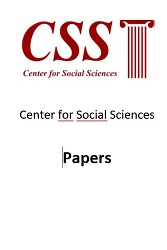The Western Imaginary and the Imagined Strategies against it in the New European Countries and the Margins of Eastern Europe
The Western Imaginary and the Imagined Strategies against it in the New European Countries and the Margins of Eastern Europe
Author(s): Lia Tsuladze
Subject(s): International relations/trade, EU-Approach / EU-Accession / EU-Development, Politics and Identity
Published by: CSS - Center for Social Sciences
Keywords: Western Europe; Eastern Europe; discourse; stigmatization; nationalism;
Summary/Abstract: The following paper discusses how the Western imaginary or the way “the West looks East” reinforces the construction of “unstable” or ambivalent identities in the new European countries, as well as the margins of Eastern Europe. Particularly, it deals with the Western discourses that locate Eastern Europe and its margins in the ambivalent state of spatiotemporal transitionality, and explores the possible defense strategies of the latter. The abovementioned Western discourses are roughly divided by the author in the stigmatizing and enlightening ones though both imply a certain type of stigmatization. The “othering” (Todorova 1997) and “asymmetrical” (Melegh 2006) discourses are considered as the examples of the stigmatizing discourse, while “civilizational” discourse (Elias 1994), which is translated into the “elitist” discourse within the local settings, is considered as an example of the enlightening discourse. Furthermore, two extreme ways of “symbolic escape” by the new European countries (the cases of Poland and Romania) and the margins of Eastern Europe (the case of Georgia) are discussed: “a radical emigration... [alongside] cultural amnesia” and a “passionate nationalism and hyperbolic pride” (Kiossev 2002). Finally, the question is posed whether these strategies can help avoid stigmatization. Based on both the researches by other scholars and the recent cross-cultural research conducted among the youth in Romania, Poland and Georgia by the author of this paper, it is illustrated that such means of “symbolic escape” can cause further stigmatization and be largely responsible for a kind of “failure discourse” characteristic to the representatives of the abovementioned new European countries and the margins of Eastern Europe.
Series: CSS - Working Papers
- Page Count: 12
- Publication Year: 2015
- Language: English
- Content File-PDF

